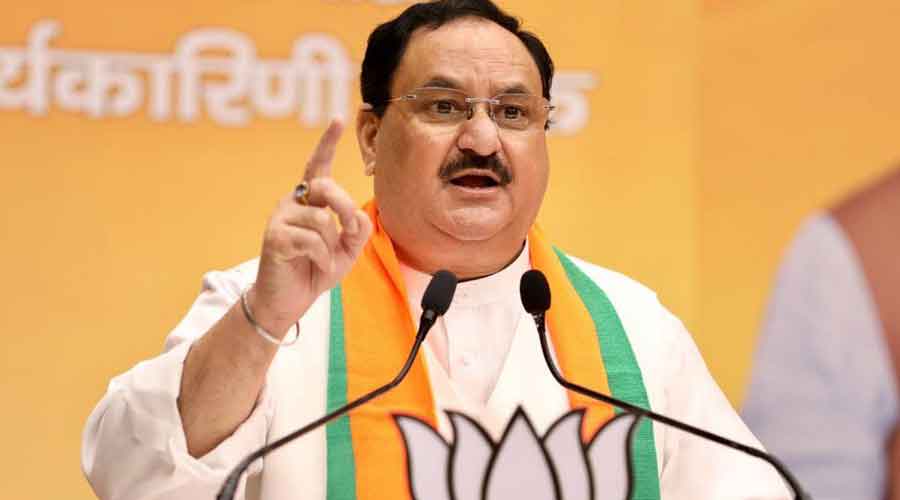The ruling BJP on Thursday released its election manifesto for Manipur, a five-year vision for growth, development and peace but the contentious Armed Forces (Special Powers) Act, 1958 — the withdrawal of which has been flagged by leading parties — does not find a mention.
The “people’s” manifesto, released by BJP national president J.P. Nadda in presence of chief minister N. Biren Singh and other senior leaders in Imphal, promised employment generation, empowerment of women and youth, necessary boost to the health, education, tourism, agriculture, connectivity, MSME and start-up sectors, among others.
Wooing women, youth, farmers and the marginalised, the party, eyeing a second straight term in power, has committed two free LPG cylinders annually to all PM Ujjwala beneficiaries, free scooty to meritorious college-going girls, free laptops to meritorious students clearing Class XII.
It also hiked the monthly pension of senior citizens from Rs 200 to Rs 1,000 and assistance under the PM Kisan Samman Nidhi Yojana from Rs 6,000 to Rs 18,000 per annum.
Nadda said, “It (manifesto) is not a piece of paper but our commitment to the people of Manipur.... The state has undergone a change from instability to stability and from stability to the big leap forward - we will ensure more development in the future.”
Manipur goes to the polls on February 28 and March 5.
The preparation of the manifesto was a first-of-its-kind exercise where the opinions of every stakeholders were sought to reflect the aspirations of every Manipuri, the chief minister said, tweeting the key promises.
Asnikumar Singh, top spokesperson, Manipur BJP unit and convener of the manifesto panel told The Telegraph that the election will be fought on the plank of GDP — growth, development and peace. “Our BJP-led government has provided the most people-centric governance in the state’s political history in the last five years. And we will continue to do so by making GDP our only objective, something which is reflected in our manifesto. We are sure Manipur’s peace-loving people will choose the BJP yet again — and with comfortable margin,” he said.
However, the AFSPA issue was conspicuous by its absence in the manifesto. Demand for its withdrawal grew after the botched counter-insurgency operation in Mon district of neighbouring Nagaland in December last year.
Protests were also staged in Naga-inhabited areas of the state against the law that gives sweeping powers to the armed forces to search, arrest and shoot in areas disturbed under the central law.
All major parties have promised to get the law withdrawn. These include the Opposition Congress, the Naga people’s Front, National People’s Party, the JDU allies of the BJP, but fighting the upcoming polls on their own.
Leading rights activist Babloo Loitongbam said it was “very unfortunate” that the AFSPA issue did not find mention in the manifesto at a time when other parties are “talking about” the central law.
“This is an issue on top of everyone’s mind. All other parties have taken a stand against it. They (BJP) have consulted the people but the sentiment against the law have not been reflected.... Very unfortunate,” Loitongbam said.
Dr Rajkumar Ranjan Singh, the manifesto committee chairman, said it was “not possible” to place the AFSPA issue in the manifesto because it relates to national security.
“But in practice we are supporting the people’s aspiration (AFSPA repeal) and we are talking to the concerned ministry. It is not necessary to reflect it in the manifesto. Law and order is improving and once it improves fully, it will be automatically removed," Ranjan Singh said.
He added, “Majority of people at the moment are thinking about employment generation and development and we are focussing on that ... but we are not neglecting the demand (AFSPA repeal) of the people.. we are considering it (AFSPA repeal demand) and talking to the ministry.”
Another senior leader pointed to chief minister N. Biren Singh statement in January where he had said that he wanted the withdrawal of the AFSPA like the people of the state but this had be done with the consent of the Centre because national security came first, referring to Manipur being a sensitive state bordering Myanmar, which is presently in turmoil.
Few of BJP’s commitment:
⚫ Protecting the territorial integrity and preserving the rights of the indigenous people of Manipur and its rich cultural heritage
⚫ Introduction of Aspirational Block Programme for development of selected blocks and introduction of One Sub Division One Product scheme to promote indigenous produce to boost local economy
⚫ Interest-free loans to MSMEs. Establishment of Rs 100 crore Start-Up Manipur Fund to provide zero-interest loans of up to Rs 25lakh
⚫ FO-FO train (Follow Foothills train), a peripheral rail network along the foothills of the state to boost tourism
⚫ To promote local tourism, cash incentives and subsidies for the homestay owners, aiming to generate around 1 lakh employment. Launch of Loktak Mega Eco-tourism project.
The Congress’ Manipur unit dubbed the BJP manifesto as a “comprehensive statement of failures” of the ruling BJP in the last five years, not mentioning about the AFSPA, the Naga peace talks, non-holding of civil services exams by the Manipur Public Service Commission since 2017 and non-holding of the autonomous district council polls.
Union cabinet minister Smriti Z Irani, while campaigning in Manipur on Friday, defended the manifesto as one promising a better and brighter future for the state.
Senior party leader Rahul Gandhi will be visiting Imphal on February 21 to mobilise support for the Congress, his first in run up to the polls. On February 15, party general secretary Priyanka Gandhi had addressed a virtual rally.











